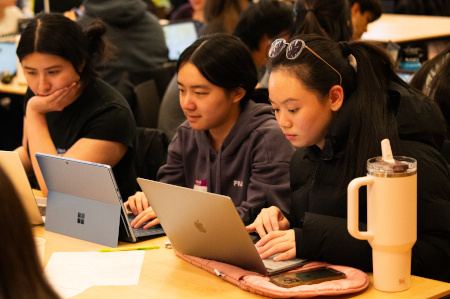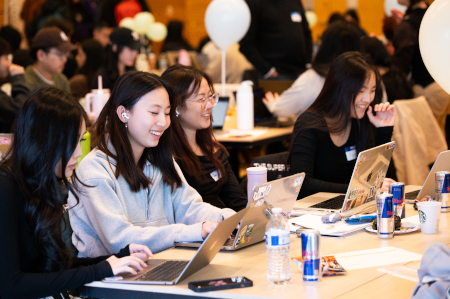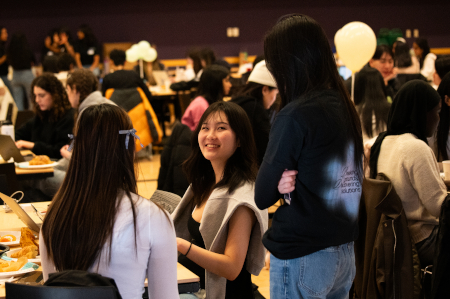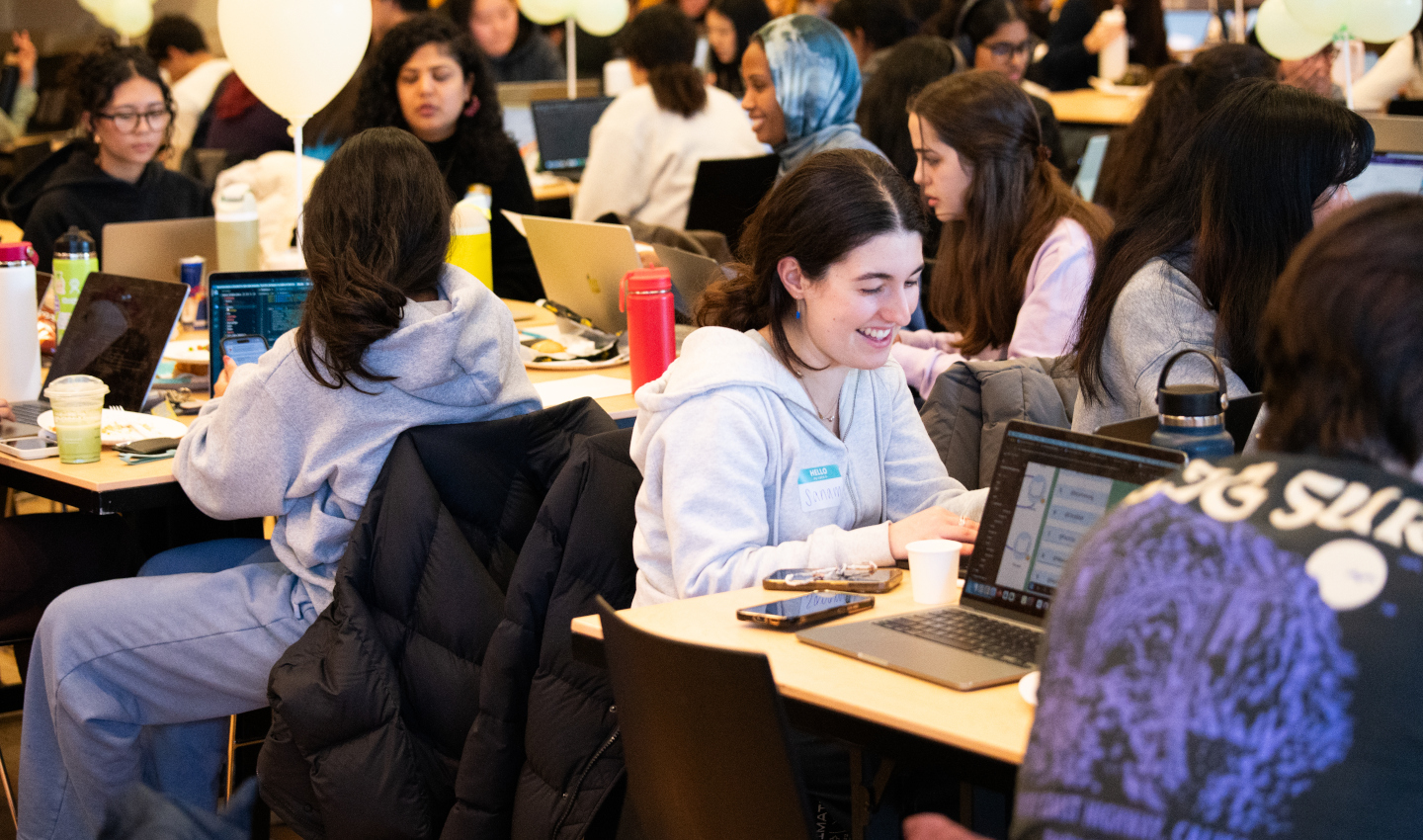The HUB ballroom buzzed with the sounds of typing, conversation and event organization as 255 students teamed up for the 13th annual WINFO Hackathon. Over the course of 12 hours, students developed and submitted 70 unique projects, all with the collective goal to push boundaries and have real-world impact.

The beginner-friendly hackathon is geared toward underclassmen and welcomes students from both Informatics and other majors, providing an opportunity to meet peers, develop skills and explore the field of technology.
A total of 343 attendees, including 255 participants, 26 WINFO volunteers, 47 mentors and 12 judges, checked in for the all-day event on Jan. 25.
True to WINFO’s mission of fostering innovation, this year’s theme, "Breaking Grounds, Discovering Solutions" encouraged participants to challenge limits while staying true to themselves. Hackathon director Pournami Varma emphasized how this theme aligned with the organization’s core values.
“There's truly no limit to what they're really looking into or what they're planning to do,” Varma said. “[But if participants] reinforce this theme of being who you are, I think it'll really add that personal touch to the project that they end up working on.”
In the HUB ballroom, students were immersed in their projects, mentors spread throughout the room checking in on groups and taking notes of their favorite projects.
Mentors played a key role in the event, providing guidance and selecting finalists for categories such as Best Overall, Best Coding, Best Impact and Best Design.
Mentor Kateryna Tymofeieva, an Informatics ‘22 graduate who currently works as a product manager at Pitchbook, volunteered as a mentor because of her previous experience participating at the hackathon.
When looking at final candidates, Tymofeieva observed how groups responded to her feedback throughout the day and how they adapted.
“That's what hackathons are all about, taking feedback from one another,” Tymofeieva said.
One team that embraced the spirit of the theme was Furever, which won Best Design for its innovative approach to pet adoption.
Kelly Horak and her team designed what they described as a dating app for dogs and potential adopters. Inspiration for the project came when Horak and her teammate and roommate Sophia Mangrubang wanted to adopt a dog themselves.
“We would use Petfinder a lot and one of the things we found when we were using traditional pet websites is that they feed you a lot of dogs at once,” Horak said. “So we wanted to minimize the amount of intake that a user was getting when they wanted to look for a dog.”

The WINFO Hackathon team wanted to focus on enriching the experience of the participants, finding new ways to ensure that students enjoyed the long day. The event included a catered breakfast, lunch and dinner, RedBull was an exclusive energy drink sponsor and provided games, and the team hired Booth’d to set up their custom photo booth.
“What we're doing this year is we brought in this photo booth so people can destress, take a break and also before they leave they can take their picture to capture memories made during the day,” Varma said.
The robust team of volunteers helped distribute food, check in participants and mentors, and ensure the event ran smoothly. Varma said she did not feel as much pressure at the event because of the extensive work of the volunteers.
“You have people you can count on, and at the end of the day hosting such a big event like this, it’s really important to have those people,” Varma said.
For many students, the hackathon was about more than just competition — it was about community and growth.
WINFO creative team member Varsha Bharath joined the student organization to be a part of a tight-knit community that would allow her to participate in professional events like the hackathon.
“I did [the hackathon] last year and it's really a friendly thing to come into because I had never done a hackathon before and I didn’t feel overwhelmed by any means,” Bharath said.
It was WINFO diversity committee member Mia McDunnah’s first hackathon. Similar to Bharath, she joined the student organization for a sisterhood and to have opportunities to network and be a part of a supportive community.
“It’s very encouraging to try experimenting with code and collaborating with others,” McDunnah said. “I think it's a great opportunity for students to network with industry professionals and it’s great for people who want to try new things and just want to test themselves.”
The 10-member hackathon committee has been working for over 10 months to organize the event and secure industry sponsors. These sponsors, including Accenture, Adobe, Avanade, Costco, Cyborg Mobile, EY, Microsoft, Pitchbook and the iSchool, engaged with participants throughout the day.
“Getting your first job out of college is pretty scary,” Costco IT recruiter Adam Green said. “We are here to be able to talk to students…and be able to give them some career advice, resume advice, things like that.”
The hackathon is one of the major events that club members and Informatics students look forward to each year. For Kayla Tounalom, the WINFO diversity committee advisor, the hackathon is a special moment to encourage students to participate.
“This is an experience, something you should be proud of,” Tounalom said. “And it's just amazing that this event has so much positivity around it and awareness.”
She emphasizes that the hackathon is an opportunity for students to come in and work on projects they are passionate about.

“It's a celebration of students at the UW iSchool,” Tounalom said. “And it's not really a competition, if anything, I think it's just a great environment for people who want to have fun.”
At the end of the day, the judges did select four winning teams. Best Design went to Furever, created by Vera Guber, Sophia Mangrubang and Kelly Horak. Best Impact went to Memory Bloom, created by Crystal Shen, Sawani Deshmukh, Jenna Moon-Earle and Katherine Zhang. Best Coding went to Lynk, created by Asad Jaffery, Joshua Williams, Vaibava Venkatesan and Amrith Gandham. Best Overall went to Beacon, created by Mihika Jain, Ayush Gupta, Roshan Mettupalli and Swetha Puvvada.
“We were so shocked,” Best Design winner Horak said. “I was so surprised, and [our group] is such good friends so it felt really good. It was all our senior year, so it felt really full circle for us to be able to do it together.”
